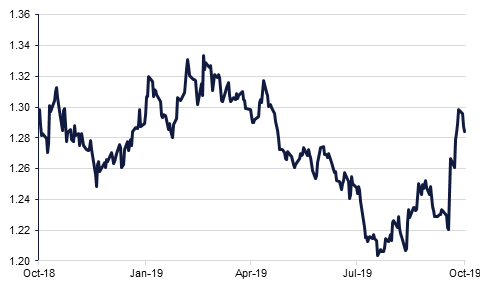
Following the defeat of UK Prime Minister Boris Johnson’s timetable for leaving the EU in the UK Parliament yesterday, it is currently unclear whether or not he will call a general election, or continue trying to push through his EU withdrawal deal. Before the defeat, the PM had won a victory in the vote in principle on his deal, with 19 voters from the opposition Labour Party, but the failure to agree on the rushed timetable for the bill makes an extension to the Brexit deadline highly likely. There have been positive noises from EU officials regarding this, but the Prime Minister remains adamant that the October 31 deadline for the UK to leave the EU will still be met. The pound weakened on the result.
US existing home sales declined -2.2% m/m in September, the slowest pace in three months.
The consensus expectation had been for a -0.7% decline. A shortage in supply has pushed up property prices, offsetting the beneficial effects of wage growth and low mortgages.
Dubai-based ports operators, DP World, has announced Q3 results. While its global portfolio managed some weak growth on a like-for-like basis over the first three quarters of the year despite the negative impact of trade wars, Jebel Ali saw a 1.0% y/y throughput decline in the third quarter, dipping to 3.6mn TEUs. The company chairman said that the ‘outlook remains uncertain.’
Despite a raft of concessions offered to protestors by the Lebanese Prime Minister, Saad al-Hariri, demonstrations continued in Lebanon yesterday, with many calling for more wholesale changes at the top. The new fiscal plan put forward by the government is ambitious, but the -0.6% of GDP deficit target for 2020 is unlikely to be met under current plans unless there is a significant acceleration in GDP growth – itself unlikely.
 Source: Emirates NBD Research, Bloomberg
Source: Emirates NBD Research, Bloomberg
Treasuries traded higher in what was a choppy session of trading. The loss of UK government in parliament to accelerate the process of ratification impacted investor sentiment. Yields on the 2y UST, 5y UST and 10y UST closed at 1.59% (-3 bps), 1.58% (-3 bps) and 1.76% (-3 bps) respectively.
In regional markets, it was all about Saudi Arabia’s sovereign issue. The Kingdom of Saudi Arabia raised USD 2.5bn in a 10y sukuk which was priced at MS+127bps. Overall, bonds remained flat with the YTW on Bloomberg Barclays GCC Credit and High Yield index closing at 3.28% and credit spreads hovering at 158 bps.
Following the set-back suffered by UK Prime Minister Boris Johnson yesterday with regards the timetable for his EU departure deal, the pound slipped against the greenback as the likelihood of a delay increased. It is now trading at USD 1.2851, compared to 1.30-plus levels seen in intraday trading earlier this week. While this is still some margin stronger than the USD 1.22/GBP levels seen earlier this month when no-deal fears were more prevalent, the exchange rate will remain highly susceptible to headlines.
Developed market closed mixed as Brexit conundrum late in the day roiled investor sentiment. The S&P 500 index dropped -0.4% while the Euro Stoxx 600 index gained +0.1%.
Regional markets closed higher as investors positioned themselves ahead of key quarterly earnings. The DFM index and the Tadawul gained +0.9% and +1.4% respectively. Most market heavyweights closed higher with Emaar Properties adding +1.4% and Arabtec gaining +0.5%. Mid-cap stocks continue to gain investor attention with Deyaar Properties rallying +10.5%.
Both major oil benchmarks strengthened yesterday on the back of reports that OPEC+ could extend their programme of curbing production in a bid to shore up prices in the face of slack demand when they meet in Vienna in December. WTI gained 2.2% to USD 54.5/b, while Brent prices rose 1.3% to USD 59.7/b.
However, prices are declining once again in early trading today, following an API report that US inventories of crude oil expanded by 4.5mn barrels last week, a sixth consecutive week of gains. Brent was trading at USD 59.4/b at the time of writing, while WTI had dipped to USD 54.1/b.